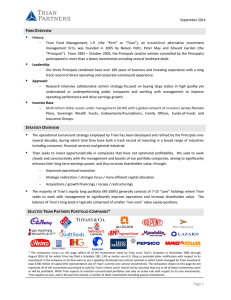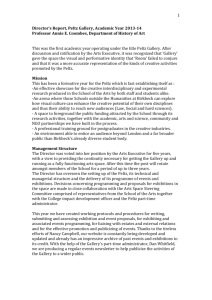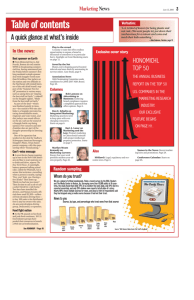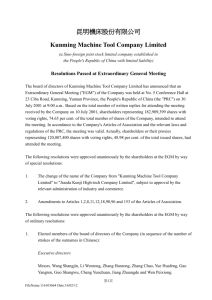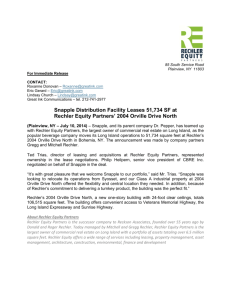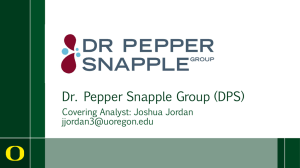Trian Overview and History
advertisement
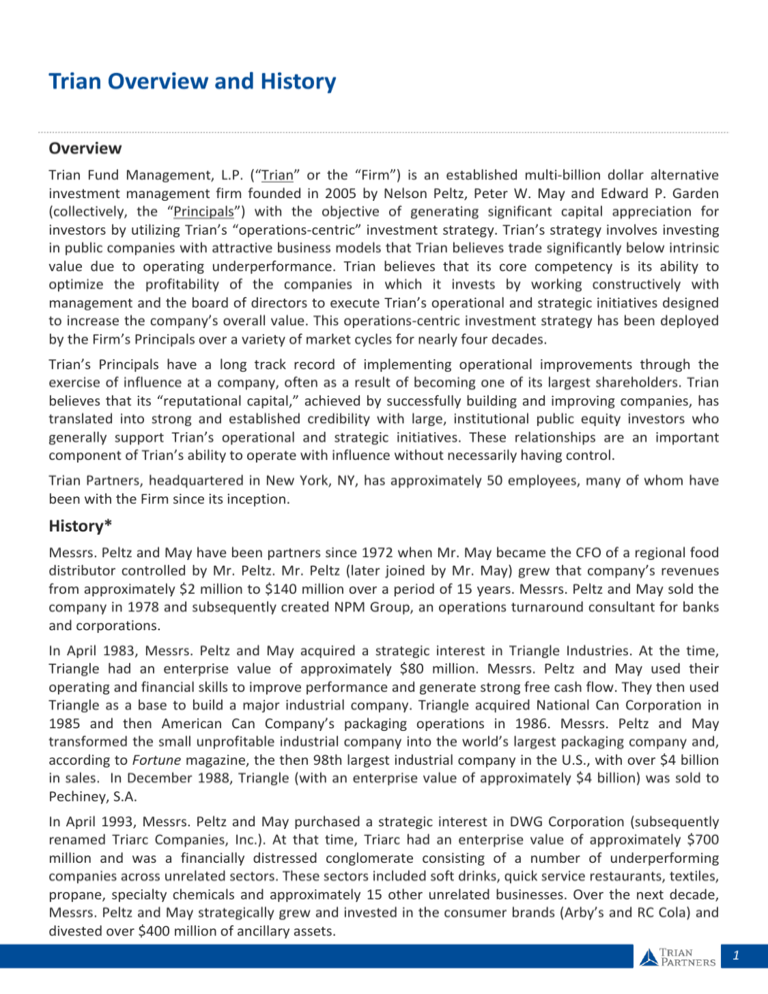
Trian Overview and History Overview Trian Fund Management, L.P. (“Trian” or the “Firm”) is an established multi-billion dollar alternative investment management firm founded in 2005 by Nelson Peltz, Peter W. May and Edward P. Garden (collectively, the “Principals”) with the objective of generating significant capital appreciation for investors by utilizing Trian’s “operations-centric” investment strategy. Trian’s strategy involves investing in public companies with attractive business models that Trian believes trade significantly below intrinsic value due to operating underperformance. Trian believes that its core competency is its ability to optimize the profitability of the companies in which it invests by working constructively with management and the board of directors to execute Trian’s operational and strategic initiatives designed to increase the company’s overall value. This operations-centric investment strategy has been deployed by the Firm’s Principals over a variety of market cycles for nearly four decades. Trian’s Principals have a long track record of implementing operational improvements through the exercise of influence at a company, often as a result of becoming one of its largest shareholders. Trian believes that its “reputational capital,” achieved by successfully building and improving companies, has translated into strong and established credibility with large, institutional public equity investors who generally support Trian’s operational and strategic initiatives. These relationships are an important component of Trian’s ability to operate with influence without necessarily having control. Trian Partners, headquartered in New York, NY, has approximately 50 employees, many of whom have been with the Firm since its inception. History* Messrs. Peltz and May have been partners since 1972 when Mr. May became the CFO of a regional food distributor controlled by Mr. Peltz. Mr. Peltz (later joined by Mr. May) grew that company’s revenues from approximately $2 million to $140 million over a period of 15 years. Messrs. Peltz and May sold the company in 1978 and subsequently created NPM Group, an operations turnaround consultant for banks and corporations. In April 1983, Messrs. Peltz and May acquired a strategic interest in Triangle Industries. At the time, Triangle had an enterprise value of approximately $80 million. Messrs. Peltz and May used their operating and financial skills to improve performance and generate strong free cash flow. They then used Triangle as a base to build a major industrial company. Triangle acquired National Can Corporation in 1985 and then American Can Company’s packaging operations in 1986. Messrs. Peltz and May transformed the small unprofitable industrial company into the world’s largest packaging company and, according to Fortune magazine, the then 98th largest industrial company in the U.S., with over $4 billion in sales. In December 1988, Triangle (with an enterprise value of approximately $4 billion) was sold to Pechiney, S.A. In April 1993, Messrs. Peltz and May purchased a strategic interest in DWG Corporation (subsequently renamed Triarc Companies, Inc.). At that time, Triarc had an enterprise value of approximately $700 million and was a financially distressed conglomerate consisting of a number of underperforming companies across unrelated sectors. These sectors included soft drinks, quick service restaurants, textiles, propane, specialty chemicals and approximately 15 other unrelated businesses. Over the next decade, Messrs. Peltz and May strategically grew and invested in the consumer brands (Arby’s and RC Cola) and divested over $400 million of ancillary assets. 1 Trian Overview and History (CONT’D) Triarc’s beverage platform, Royal Crown Corporation, was transformed by Messrs. Peltz and May into a premium beverage company through the acquisition of several businesses, including Snapple in 1997. Despite Snapple’s significant underperformance and negative cash flows under Quaker Oats’ management between 1994 and 1997, Messrs. Peltz and May believed they could stabilize the brand’s volume losses and restart growth. Thus in 1997, Triarc acquired the underperforming Snapple brand (with an enterprise value of approximately $300 million) from Quaker Oats and engineered a marketing and operational turnaround (see “How Snapple Got Its Juice Back,” Harvard Business Review, January 2002), which became a Harvard Business School case study. Between 1997 and 2000, while led by Messrs. Peltz and May, Snapple reversed several years of dramatic volume declines by creating a leaner organization eliminating unnecessary bureaucracy and focusing on innovative consumer marketing and new product introductions. In 2000, Triarc sold its beverage businesses, which included Snapple as well as three other smaller beverage brands (collectively, with an enterprise value of approximately $1.5 billion) to Cadbury Schweppes (3 years after acquiring Snapple). In 2003, Mr. Garden joined Messrs. Peltz and May at Triarc and was instrumental in transitioning the investment model from a public company platform to an alternative asset manager with third party capital, culminating in the creation of Trian in 2005. While Messrs. Peltz and May had established a long track record of buying and building companies between 1983 and 2005, they and Mr. Garden believed larger capitalization companies offered the best risk/reward investment opportunities and that leveraging the scale of outside capital would allow Trian to pursue such opportunities. Thus, Trian began managing investment funds in November 2005 deploying both the Principals’ capital and outside institutional capital with the same operations-centric investment strategy described above. Today, Trian has nine partners: the three Principals, together with Brian Schorr, Matt Peltz, Josh Frank, Brian Jacoby, Brian Baldwin and Greg Essner. Trian believes it has become widely regarded as a valueadded agent of change for under-performing, undervalued public companies. SOURCE: Unaudited Trian Information * In addition to the businesses referenced in the “History” section, Messrs. Peltz and May (and/or entities they controlled) participated in more than a dozen other investments from 1983-2005 involving businesses that are listed below. It should not be assumed that these investments were profitable. Additional information is available upon request. Pre-Trian business affiliations (1972-2005) include: Flagstaff Food Service, Triangle Industries, Inc., Avery, Inc., Rowe International, Inc., Brandt, Inc., Equitable Bag, Ocean View Capital, Mountleigh Group PLC, Graniteville Company, National Propane Corporation, DWG Corporation, Triarc Companies, Inc., Snapple Beverage Group, Ascent Entertainment Group, Inc., Encore Capital Group, Inc., Deerfield & Co., LLC, Jurlique International Pty Ltd and Arby’s Restaurant Group. 2
